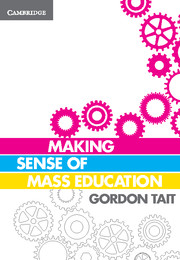Book contents
- Frontmatter
- Contents
- Acknowledgements
- INTRODUCTION
- PART 1 RE-ASSESSING THE THREE PILLARS: MODERN AND POSTMODERN SOCIOLOGIES OF EDUCATION
- PART 2 THE FOUNDATIONS OF AN ALTERNATIVE APPROACH: EDUCATION AND GOVERNANCE
- CHAPTER 4 GOVERNANCE
- CHAPTER 5 SUBJECTIVITY
- CHAPTER 6 PRE-ADULTHOOD
- PART 3 CULTURAL CONTEXTS OF CONTEMPORARY EDUCATION
- PART 4 PHILOSOPHY AND MASS EDUCATION
- CONCLUSION
- References
- Index
CHAPTER 6 - PRE-ADULTHOOD
from PART 2 - THE FOUNDATIONS OF AN ALTERNATIVE APPROACH: EDUCATION AND GOVERNANCE
- Frontmatter
- Contents
- Acknowledgements
- INTRODUCTION
- PART 1 RE-ASSESSING THE THREE PILLARS: MODERN AND POSTMODERN SOCIOLOGIES OF EDUCATION
- PART 2 THE FOUNDATIONS OF AN ALTERNATIVE APPROACH: EDUCATION AND GOVERNANCE
- CHAPTER 4 GOVERNANCE
- CHAPTER 5 SUBJECTIVITY
- CHAPTER 6 PRE-ADULTHOOD
- PART 3 CULTURAL CONTEXTS OF CONTEMPORARY EDUCATION
- PART 4 PHILOSOPHY AND MASS EDUCATION
- CONCLUSION
- References
- Index
Summary
This chapter argues that educators need to have a good grasp of all the various forms of pre-adulthood we take for granted, such as ‘the child’ and ‘the youth’. These categories are the focus of a range of different disciplines, most of which found their explanatory models in nature itself. As such, the behaviour of children and youth may be deemed to require explanation, but not the very existence of the categories themselves. The issues raised in this chapter concern the degree to which childhood and youth are actually socially constructed categories, categories serving particular social functions. Of greatest interest here are the ways in which childhood and youth are both artefacts of, and vehicles for, social governance.
Myth #1 ‘Childhood’ and ‘youth’ are facts of nature
We didn't invent children or youths; they have always been here. These aren't socially constructed categories. They exist in all cultures, and have existed in all eras.
The evidence suggests that childhood and youth are both social inventions, childhood emerging from the fifteenth century onwards, and youth appearing in the early 1950s. It has also been suggested that childhood is now in the process of disappearing again, with youth expanding to fill its place.
Myth #2 The categories of ‘childhood’ and ‘youth’ have nothing to do with governance
Though not the product of nature, the notions of childhood and youth developed as they did for purely cultural reasons.
These categories of pre-adulthood are both the products of government, and the vehicles for its effective operation. They are shaped most thoroughly through the governmental sites of the mass school, and the pedagogic family.
- Type
- Chapter
- Information
- Making Sense of Mass Education , pp. 120 - 140Publisher: Cambridge University PressPrint publication year: 2012



